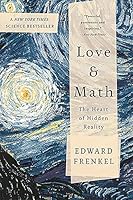
## Metadata
- Author: [[Edward Frenkel]]
- Full Title: Love and Math
- Category: #books
## Highlights
- Mathematical knowledge is unlike any other knowledge. While our perception of the physical world can always be distorted, our perception of mathematical truths can’t be. They are objective, persistent, necessary truths. A mathematical formula or theorem means the same thing to anyone anywhere – no matter what gender, religion, or skin color; it will mean the same thing to anyone a thousand years from now. And what’s also amazing is that we own all of them. No one can patent a mathematical formula, it’s ours to share. There is nothing in this world that is so deep and exquisite and yet so readily available to all. That such a reservoir of knowledge really exists is nearly unbelievable. It’s too precious to be given away to the “initiated few.” It belongs to all of us. ([Location 117](https://readwise.io/to_kindle?action=open&asin=B00BKRW5E6&location=117))
- Tags: [[favorite]]
- Solving a mathematical problem is like doing a jigsaw puzzle, except you don’t know in advance what the final picture will look like. It could be hard, it could be easy, or it could be impossible to solve. You never know until you actually do it (or realize that it’s impossible to do). This uncertainty is perhaps the most difficult aspect of being a mathematician. In other disciplines, you can improvise, come up with different solutions, even change the rules of the game. Even the very notion of what constitutes a solution is not clearly defined. For example, if we are tasked with improving productivity in a company, what metrics do we use to measure success? Will an improvement by 20 percent count as a solution of the problem? How about 10 percent? In math, the problem is always well defined, and there is no ambiguity about what solving it means. You either solve it or you don’t. ([Location 1118](https://readwise.io/to_kindle?action=open&asin=B00BKRW5E6&location=1118))
- Though Gelfand did not prove any famous long-standing conjectures (such as Fermat’s Last Theorem), the cumulative effect of his ideas on mathematics was staggering. Perhaps more importantly, Gelfand possessed an excellent taste for beautiful mathematics as well as an astute intuition about which areas of mathematics were the most interesting and promising. He was like an oracle who had the power to predict in which directions mathematics would move. ([Location 1356](https://readwise.io/to_kindle?action=open&asin=B00BKRW5E6&location=1356))
- I wrote in the Preface that one of the principal functions of mathematics is the ordering of information, or, as Langlands himself put it, “creating order from seeming chaos.”1 Langlands’ idea is so powerful precisely because it helps organize seemingly chaotic data from number theory into regular patterns full of symmetry and harmony. ([Location 1633](https://readwise.io/to_kindle?action=open&asin=B00BKRW5E6&location=1633))
- Gone are the two theories, gone their troubles and delicious reflections in one another, their furtive caresses, their inexplicable quarrels; alas, we have but one theory, whose majestic beauty can no longer excite us. Nothing is more fertile than these illicit liaisons; nothing gives more pleasure to the connoisseur.... The pleasure comes from the illusion and the kindling of the senses; once the illusion disappears and knowledge is acquired, we attain indifference; in the Gita there are some lucid verses to that effect. But let’s go back to algebraic functions. ([Location 2139](https://readwise.io/to_kindle?action=open&asin=B00BKRW5E6&location=2139))
- Indeed, a culture is kept alive by the interaction of all its parts. Its progress is an alchemical process, in which all its varied ingredients can combine to form new jewels. On this point, I imagine that Poincaré and Duchamp are in agreement with me and with each other, both having by now undoubtedly met somewhere in that hyperspace which, in their different ways, they loved so well. ([Location 2355](https://readwise.io/to_kindle?action=open&asin=B00BKRW5E6&location=2355))
- It seems inevitable that the next generations of computers will be based more on category theory than on set theory, and categories will enter our daily lives, whether we realize it or not. ([Location 3147](https://readwise.io/to_kindle?action=open&asin=B00BKRW5E6&location=3147))